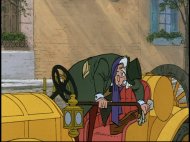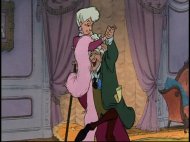
 The Aristocats is not thought of as a “disability movie”, but like many Disney movies, it does have a character with physical and visual impairments due to aging to provide visual humor, and a character who may have a more “hidden disability”. The former is an elderly lawyer who comes to the palatial mansion belonging to the old woman who owns the cats who are the stars of the movie. Though she seems physically fit, she is older, and clearly thinking of “end-of-life issues”. She calls her lawyer, Georges Hautecourt, (who obligingly makes house calls) to draft her will, leaving everything to her cats. Hautecourt is portrayed as being senile, but is a label misapplied to a man with a lot of vitality who’s evidently still practicing law despite minor disabilities.
The Aristocats is not thought of as a “disability movie”, but like many Disney movies, it does have a character with physical and visual impairments due to aging to provide visual humor, and a character who may have a more “hidden disability”. The former is an elderly lawyer who comes to the palatial mansion belonging to the old woman who owns the cats who are the stars of the movie. Though she seems physically fit, she is older, and clearly thinking of “end-of-life issues”. She calls her lawyer, Georges Hautecourt, (who obligingly makes house calls) to draft her will, leaving everything to her cats. Hautecourt is portrayed as being senile, but is a label misapplied to a man with a lot of vitality who’s evidently still practicing law despite minor disabilities.
After all, he drives one of those new-fangled motorcars (the movie is set in 1910), attempts to kiss his client on the hand (getting the cat’s tail instead, the only instance in which it is hinted that he may have a vision impairment), and dances with her before getting down to business. He uses a cane to help with his unspecified but obvious mobility impairment (he has visible trouble getting out of the car, and is shown to have an irregular gait when he is seen to be walking up to the grand house.
However, before he came to the upstairs room in which the dancing, romancing, and legal document drafting takes place, he was offered the choice of getting to his destination by taking a (human-operated) elevator, or by climbing a long, treacherous staircase of polished marble. He derides the elevator as “that birdcage” and in one of the most memorable lines of the movie, declares that “elevators are for old people”. He attempts to climb the staircase, and predictably, slips and falls backwards. Luckily, he had been accompanied up the stairs by the butler, who aids him through several slips and falls, the last and most memorable of which resulted in him hooking the butler’s stretchy suspenders with his cane, and effectively sling-shotting himself to his destination. This resulted in the butler’s pants falling down when he showed the lawyer in to the upstairs room. While it is wonderful to have a positive attitude about aging, the lawyer seems to be in denial and in spite of the comedic aspect of the scenario just described, he has put himself in any number of risky situations, setting himself up for some potentially more serious mobility impairments. This scene does nothing to advance the plot of the story, and serves only to add comic relief by poking fun at Hautecourt’s disabilities.The butler, however, may have a more “hidden disability”. Though he may have obvious reasons to resent his job (how would you like to be effectively “pantsed” by a character like this?) his knee-jerk reaction to get rid of the cats when he overhears his employer declare her intention to leave them her considerable estate bespeaks impulsivity and poor decision making. If the cats were to get the estate, surely they would need a conservator and caretaker (after all, cats are not considered mentally competent and can’t spend money or clean up after themselves).



